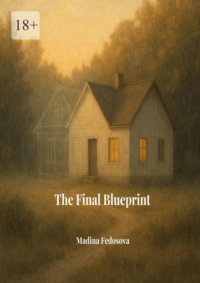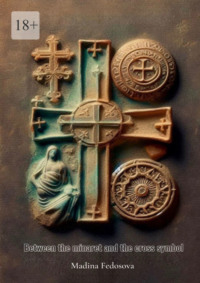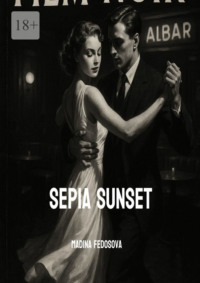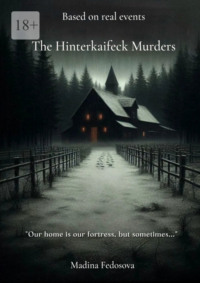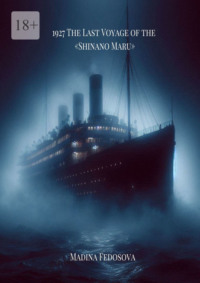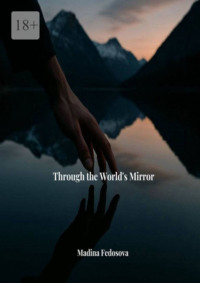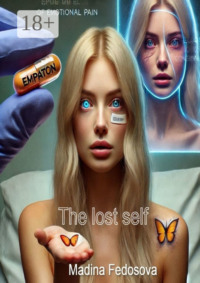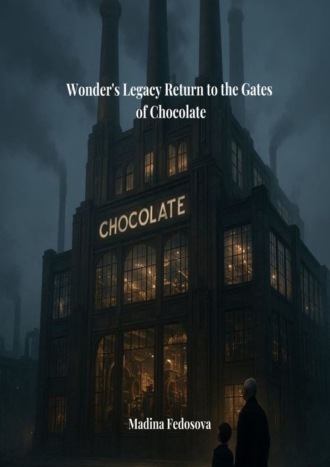
Полная версия
Wonder’s Legacy return to the gates of chocolate

Wonder’s Legacy return to the gates of chocolate
Madina Fedosova
© Madina Fedosova, 2025
ISBN 978-5-0068-1747-0
Created with Ridero smart publishing system
Author’s Foreword
Dear Reader,
What you hold in your hands is a story born of love. Love for that one special book that smells of chocolate and childhood, for that magical world you longed to enter simply by turning its paper cover.
Do you remember the feeling of reading about the golden tickets for the first time? About a river of chocolate, and an eccentric genius who hid from the world behind the walls of his own imagination? I remember. And I always felt a little sad that it all ended there. But what if those children – so different, so imperfect – were given another chance? Not just to be saved from the chocolate pipe or shrunk back to normal size, but to truly understand what happened to them and to make it right? Not as children, but as adults, with children of their own, with their own mistakes and their own sorrows.
This book is my attempt to give them that chance. This is not a sequel or an imitation. It is a conversation with a beloved work, a look at its universe from a new angle. You will not find familiar names here – only hints, a faint echo of that same magic. I am inviting you not on a tour, but on a return. A return to the «Chocolate Gates» – a symbol of a dream that, as it turns out, can wait for us for years.
Here you will find not only nostalgia but also hope. Hope that it is never too late to rewrite your own story, to understand your child, and to remember what it feels like to believe in magic.
I have merely opened the door. You are the one who must step through.
With love for magic and for the reader,
Madina Fedosova
PROLOGUE
SHADOWS OF THE PAST
In one of the grayest, rainiest corners of the world, where even the clouds seemed weary of their own hopelessness, stood a house. Not just a house – an apartment, lost in one of those endless brick buildings that resembled giant birdhouses for people who had forgotten how to fly.
In that apartment, in a room that smelled of medicine, dust, and silence, lived an old man named Julian. Once, a very long time ago, a miracle had happened to him. A real one, smelling of cocoa and chocolate, ringing with laughter and promising that life was more than just gray walls and empty pockets.
But miracles, as it turned out, have a way of ending.
Now Julian was just an old man who spent his days staring out of a fogged-up window at wet rooftops. His greatest treasure – a tattered newspaper clipping – had long since yellowed and been hidden away on the farthest shelf, a shy reminder that even the brightest happiness can fade.
And in another part of the city, behind a high fence topped with barbed wire, in an office that looked like a sterile operating room, sat a woman named Penelope Peck. Her life was full of glitter, glossy magazines, and deals that brought in millions. But if you could have looked inside her, you would have seen the same emptiness that filled old Julian’s room. Only hers smelled not of dust, but of cold metal and expensive perfume that couldn’t mask the scent of loneliness.
And so it was for each of them. Gus Glutton, owner of a chain of restaurants, drowned his anxiety in triple portions of dessert. Veronica Bolt, the queen of fitness, battled invisible enemies on workout machines. Miles Tecton, an IT genius, built virtual worlds because the real one had long since ceased to bring him joy.
All of them, once upon a time, in the same moment of their childhood, had stepped through the gates into a world of pure imagination. And each of them had lost something there. It didn’t matter what – innocence, hope, or simply faith in themselves. They had returned changed. Not who they could have been.
And then, one utterly unremarkable evening, as the rain beat against the windows even more insistently and the silence in Julian’s room grew loud, It happened.
Not a clap of thunder. Not a flash of light.
A simple postal parcel. A brown cardboard box, soaked with rain, with no return address. It bore no stamps, no seals. Just a single word, written in an elegant, old-fashioned hand: Julian.
And in the box, nestled in soft white cotton wool, lay it. Not a candy. Not a gold bar.
A small, perfectly formed crystal sweet. Inside it pulsed a tiny, flickering light. Beneath it lay a card. On it were just two lines:
«The time has come. They are waiting.
Your turn to lead.»
The old man raised the sweet to his lips with a trembling hand. He didn’t mean to eat it. He simply blew on it, as he had once blown on a dandelion to make a wish.
The crystal shell melted away at his breath, releasing not a scent, but a sound. The very sound he hadn’t heard for decades. A light, rustling laughter, like the crinkle of a wrapper. And a smell – warm, sweet, the unmistakable smell of chocolate mixed with the scent of wonder.
And then Julian understood. The Factory wasn’t just waiting. It was calling for help. Not from children. From them. Those who had messed it all up once before. Because only those who know the scent of lost happiness can ever find it again.
The journey was beginning. Again.
PART ONE
THE CRYSTAL KEY
CHAPTER 1
THE ROOM WHERE WONDER ENDED
The house at 7 Zavodskoy Lane always smelled of a specific mixture of wood floor wax, stewed cabbage, and the dust that settled on old newspapers. The smell was so persistent it seemed to have become part of the very air, soaking into the rough wallpaper with its faded roses, the worn-out carpet on the stairs leading to the second floor, and even the faces of the four elderly people who occupied the small rooms upstairs. The house itself was two stories tall, slightly crooked, its brickwork long covered in the gray lichen of city grime. It resembled a tired, stooped old man hopelessly watching the world through the murky glass of its windows.
To Oliver Pye, a twelve-year-old boy with eyes too serious for his age, it often seemed the house sighed at night. He would lie on his narrow bed in the corner of the shared bedroom and listen to the beams creaking deep within the structure. It wasn’t just a sound – it was a song, slow, mournful, and infinitely sad. A song about how time weighs down every board, how hopes are extinguished one by one, and how memories become the only fuel for the hearth. Oliver would press his ear to the cool wall, trying to decipher the melody of that creaking, but he always heard the same thing – a monotonous narrative of poverty, stretching from one day to the next.
That evening, he was sitting on the floor by his grandfather Julian’s bed. His grandfather’s room was the smallest and darkest, smelling of medicinal herbs and old paper. Julian hadn’t left his bed for several years, and his life seemed to have frozen, confined to the space between the headboard and the window, beyond which the winter dusk was slowly fading. Oliver was tinkering with a pocket watch – his recent acquisition, found at a flea market. The watch was old, with a copper case turned green, its pendulum frozen in stillness. The boy was engrossed in taking apart the complex mechanism, carefully laying out the tiny screws and shiny cogs on a clean cloth.
«Look, Grandpa,» Oliver said softly, holding out a thin, golden cog, delicate as a petal. «It’s like a little sun. A tiny, copper sun.»
Julian slowly, with effort, turned his head on the pillow. His face, etched with wrinkles, resembled old, dried-out tree bark. His eyes, usually extinguished and staring into emptiness, struggled to focus on the object in his grandson’s hand. His fingers, long and bony, trembled as they reached for the cog. He took it with unexpected tenderness, brought it right up to his eyes, and studied it for a long time, as if trying to see in its teeth the reflection of something long lost.
«A sun…» he whispered, his voice like the rustle of pages in a forgotten library. «Yes, it is. But there were others… treasures. Quite different.» He fell silent, catching his breath. Oliver froze, afraid to scare off this rare moment of openness. «They were… golden. But not cold like this. They were warm. And sweet to the taste. And they smelled… they smelled of the sky.»
«Sweet gold?» Oliver asked, surprised, edging even closer to the bed. «Does that exist?»
«It exists, my boy. The world holds all sorts of things,» a spark flashed in the old man’s eyes for a moment – the very spark Oliver saw less and less often, a glimpse of a distant but bright bonfire. «One such treasure could open a door. Not this one,» he nodded towards the door to the corridor, «but the most important one. The door to… to a land where wonders grow on trees like fruit.»
At that moment, the door creaked open, and Mrs. Pye, Oliver’s mother, came in. Her hands were red from the cold water, and her face bore the stamp of endless weariness, familiar to those who work tirelessly yet still barely make ends meet.
«Oliver, sweetheart,» she said, her voice laced with apathy. «Run down to Main Street, to the post office. We need to send this letter to Aunt Clara. And… buy a loaf of bread. From Mr. Grobble, you know, the ones that are cheaper in the evening.»
Oliver nodded silently, carefully gathering his treasures from the floor. He pulled on his old jacket, the sleeves of which had long since fallen short of his wrists, and went outside.
The air was cold and damp, smelling of wet asphalt and smoke from distant chimneys. The streetlights were already on, casting long, blurry shadows on the cobblestones that merged into one large dark stain. To brighten his journey, Oliver invented a game: he tried to step only in the circles of light under the streetlamps. He imagined the dark gaps were raging rivers of black treacle, and the bright islands were safe rafts of marshmallow. A step onto a shaky «marshmallow» – and you were safe; a step into the «treacle» – and you’d be swept away into the unknown.
The post office on Main Street was an unwelcoming place with a high ceiling stained green and a long wooden counter behind which a single clerk was dozing. Oliver went through the necessary procedure, handed over the money, and received a receipt. It smelled of glue, dust, and loneliness.
Mr. Grobble’s shop was in the next alley, down a narrow, poorly lit street. The shop window was dim, cluttered with jars of hard candy and modest pastries. But Oliver knew his family could only afford the stale bread that Mr. Grobble sold for half price before closing.
Returning home with the paper-wrapped loaf under his arm, Oliver decided to take a shortcut through an old, cluttered alley that served as the local dump. The air here was thick and bitter. Dilapidated crates were piled along the walls, and some rags spilled out of an overflowing, rusty bin. And there, next to this trash bin, on a surprisingly clean and dry piece of cardboard, lay a small cardboard box. It was neat, the color of ivory, and its lid wasn’t dented or stained in the slightest. That in itself was a miracle. But the real miracle was the single inscription on the lid, written in an elegant, ink-and-curlicue hand:
Pye.
Oliver’s heart beat so hard he could hear it in his ears. He looked around – the alley was empty. It was as if fate itself had placed this item here just for him. The boy bent down, held his breath, and picked up the box. It was weightless.
Curiosity overpowered caution. With trembling fingers, he lifted the lid.
Inside, nestled on the softest, snow-white cotton wool, was something that took his breath away. It was a sweet. But unlike any sweet he had ever seen in his life. It was carved from perfectly clear, sparkling crystal. And in its very heart pulsed, as if alive, a tiny light, casting miniature rainbow highlights onto the dirty walls of the alley. From it came a subtle, barely perceptible, yet absolutely magical aroma – a mix of bitter cocoa, vanilla, and something unrecognizable but infinitely festive, like the smell of a Christmas tree and tangerines.
Beneath the sweet lay a piece of thick, yellowish paper, folded in two. Oliver, hardly breathing, unfolded it. The letters were written in the same elegant hand:
«One key unlocks a thousand doors.
One memory can resurrect a thousand hopes.
Your turn to lead. They are waiting.»
Oliver clenched the crystal sweet in his palm. It was surprisingly warm, like a living heart. He didn’t understand what these words meant, who had written them, or how this box had ended up here, in this dirty alley. But his childish heart told him the most important thing: this message was meant for him. And it was somehow, incredibly, connected to the mysterious «golden treasures» his grandfather had spoken of just an hour ago, lying in his dark room.
Hiding the precious find inside his shirt, he grabbed the loaf of bread and started running home, forgetting his game of light and shadow, the cold, and all the gray reality surrounding him. In his chest blazed the very spark he had seen in his grandfather’s eyes. Only now it wasn’t a reflection, but a real, kindling flame. The flame of a wonder he was carrying into his home, where, it seemed, all wonders had long since ended.
CHAPTER 2
A WHISPER FROM THE PAST
Running home with the precious treasure hidden inside his shirt, Oliver felt as if he were flying, not feeling the stones of the pavement beneath his feet. It seemed to him that he was running on clouds, clutching not a crystal sweet in his hand, but a pulsating star itself, lighting the way in the darkness. The smell of the factory, that magical scent emanating from the crystal, mixed with the cold night air, creating a strange, intoxicating cocktail of reality and fairy tale.
Entering the hallway, he froze, listening. The house was plunged into its usual, oppressive silence, broken only by the measured ticking of the grandfather clock in the corner – a sound marking the seconds of a monotonous life. From behind his grandfather’s door came a soft, intermittent cough. On tiptoe, careful not to creak the floorboards, Oliver slipped into the bedroom.
Julian was awake. He lay in the same position, staring at the ceiling, but a question seemed to lurk in his eyes, as if he sensed that something was about to happen.
«Grandad,» Oliver whispered, approaching the bed. «Grandad, look what I found.»
He unclenched his palm. In the semi-darkness of the room, the crystal sweet flared up with renewed strength. Its inner light cast strange, dancing highlights on the old man’s wrinkled face, like sunbeams on the surface of water.
Julian slowly raised himself on his elbows. His eyes, usually cloudy, widened in amazement. A whole gamut of emotions flashed within them – disbelief, fear, and… hope. A trembling, withered hand reached for the crystal but stopped a centimeter away, as if afraid to touch a ghost.
«Where…?» he breathed out, his voice hoarse and strained. «Where did you get this, boy?»
«In the alley. It was lying on some cardboard. The box had our name on it,» Oliver explained hurriedly, breathlessly, handing his grandfather the card with the message as well.
Julian took the yellowish piece of paper. His fingers trembled so much the paper rustled like autumn leaves. He brought it right up to his eyes, peering at the elegant curlicues of the letters. He read for a long time, whispering each line with his lips. When he finished, his hand dropped helplessly onto the blanket. A single, glistening tear rolled down his cheek, catching the light of the crystal.
««Your turn to lead’…» he whispered. «So, he remembered. All these years… he remembered us.»
«Who, Grandad? Who remembered?» Oliver sat on the edge of the bed, his heart ready to leap out of his chest. «Is it that man? From the factory? The one who gave out the golden tickets?»
Julian nodded, looking away into the past, which was more vivid to him than the dim reality of the room.
«His name was Wonderingly Wonder,» he began, and his voice gained unexpected strength, as if the tale of his youth gave him energy. «And his factory was… it was like nothing else on earth. There, rivers flowed not with water, but with the thickest, darkest chocolate. The grass on the lawns was made of soft, melting fondant. And the trees… ah, the trees were made of candy, and instead of leaves, they grew colorful sugar-coated dragees that chimed in the wind like crystal bells.»
Oliver listened, holding his breath, his eyes shining. He pictured these wonders, and the room with its smell of medicine and dust seemed to dissolve, giving way to bright images.
«And you were there? You really were?» he couldn’t help asking.
«I was,» a shadow of sadness crossed Julian’s face. «I was, my boy. But… I wasn’t alone. There were five of us. Five children who found those golden tickets. And for each of us, that tour became… a test. One was undone by his own greed, another by a spoiled and selfish temper, a third by the desire to always be first, no matter what.»
«And you?» Oliver asked quietly. «What were you like? Did you pass the test?»
Julian sighed heavily. He looked again at the crystal sweet lying on the blanket.
«I… I didn’t lose. I just… didn’t do anything wrong. I was a quiet, obedient boy from a poor family, afraid to say a word out of turn. I passed because I was unnoticeable. Because my vices were modest – not gluttony, not pride, but… timidity. A fear of life. And when Wonder declared me the winner… it wasn’t joy. It was bewilderment. I received not happiness as a reward, but a burden. The burden of that factory, that huge, incredible world I wasn’t ready for. I ran away from there, Oliver. Ran away like a thief who had stolen something he had no right to.»
Oliver looked at his grandfather, and for the first time in his life, he saw not just an old, sick man, but a boy, his own age, confused and frightened.
«But… but now he’s sent you a new chance,» said Oliver, taking the crystal key in his hands again. «He’s waiting. „They are waiting,“ that’s what it says.»
Julian looked at his grandson, and that very spark flashed in his eyes, the one Oliver had only glimpsed before.
«They are waiting,» the old man said slowly. «That means it’s not just me who’s going back. Everyone will return. Everyone who was there once. To finally set things right.»
Silence fell in the room, broken only by the ticking of the clock and the loud beating of two hearts – one old, one young, united by a single secret. Outside the window, it was still a cold, gray night, but here, in this little room that now smelled of wonders, a new journey was already beginning. A journey back, to find a way forward.
CHAPTER 3
SHADOWS OF PAST FAILURES
While Oliver and Julian were talking in their room, where the air was thick with the smell of old wood and secrets, equally astonishing events were unfolding in other parts of the city. Magic, like a persistent yet polite courier, was knocking on the doors of those who had long forgotten the way to the land of wonders.
In Mrs. Penelope Peck’s apartment, the air smelled of expensive jasmine perfume and freshly ironed linen. Everything here shone and sparkled like a piece of hard candy: crystal chandeliers, tables polished to a mirror finish, vases with artificial flowers that were beautiful but scentless. Penelope herself, a woman with a perfect hairdo, wearing a stern suit the color of pink icing, was arranging her son Leo’s new trophies on a shelf. The boy sat on a sofa the color of whipped cream, looking out the window where heavy, leaden clouds were gathering.
«Leo, darling,» Penelope’s voice was sweet, but with a metallic ring to it. «Look at this trophy they brought from abroad! „The Most Promising Student.“ Only one in a thousand gets this. You must put it in the most prominent place.»
«It’s beautiful, Mom,» Leo replied quietly, not turning from the window.
««Beautiful’ isn’t enough, son. It’s significant!» Penelope corrected him. «Those who don’t have trophies like this will never succeed. Remember that.»
Suddenly, her gaze fell on the coffee table. On its perfectly polished surface lay a small, velvet pouch the color of ripe cherries. It hadn’t been there a second ago.
«What is this?» Penelope frowned. «Leo, is this yours?»
«No, Mom.»
She picked up the pouch. It was warm and soft to the touch. Untying the silk drawstring, she poured the contents into her palm. It wasn’t a gemstone or a piece of jewelry. It was a lump of sugar, but not an ordinary one – it was perfectly transparent, like rock crystal. A rainbow of light played inside it. And it smelled… not of sweetness, but of wet asphalt after a summer rain, the paint on a brand-new bicycle, and the carefree laughter of children playing in a courtyard.
«What trash!» Penelope exclaimed, but she didn’t throw it away; instead, she clenched it in her fist. The scented memories washed over her with such force that her head spun. She saw herself as a little girl in a dress that was no longer perfectly clean and tasted the most ordinary, yet so desired, ice cream from a kiosk in the park.
«Mom,» Leo said softly, coming closer. «But it’s beautiful. Can we keep it?»
Penelope didn’t answer. She silently stuffed the crystal sugar into the pocket of her impeccable blazer. A single, forbidden tear, against all rules, glistened on her cheek.
Meanwhile, Mr. Gus Glutton was making his rounds in his restaurant, «The Sweet Kingdom.» The sign outside was shaped like a crown studded with glowing candy-shaped bulbs. Inside, it smelled of vanilla, chocolate, and something cloying, like too much perfume. Waiters in starched aprons glided silently between tables, and a gigantic chandelier shaped like a bunch of grapes hung from the ceiling, each grape made of cast glass.
Gus, a man with a face resembling a well-baked bun, sat at a corner table, devouring a slice of a three-tiered cake with an appetite devoid of joy. He wasn’t eating because he was hungry, but because it was his job – to taste.
«Tasteless,» he grumbled, pushing the plate away. «Completely tasteless. Too much cream, the sponge is dry. Into the trash!»
Suddenly, a slight movement at the edge of the table caught his eye. A single berry was rolling across the tablecloth with a barely audible rustle. Not a real one, but a caramel berry, amber-transparent, with a golden fire dancing inside it. It rolled right up to his hand and stopped. It smelled of woodsmoke and warm bread with butter – simple, honest food.
«What nonsense?» Gus muttered, but his hand reached for the berry on its own. He picked it up. It was warm. And suddenly, he vividly remembered how, as a child, long before the golden ticket, he had roasted marshmallows over a campfire with his parents. They were charred on the outside and melting on the inside, and it was the best taste in the world.
«Chef?» a waiter approached. «Shall I take the cake away?»
Gus flinched and quickly closed his hand around the caramel berry.
«No… No, leave it. And… bring me a glass of plain milk. The most ordinary kind.»
In the «Victory» athletic club, Miss Veronica Bolt’s domain, the clang of dumbbells and rhythmic, metronome-like breathing filled the air. The walls were painted metallic steel, and the floor reflected the light like ice. Veronica herself, a woman with sharp features and hair pulled into a tight bun, was pushing her daughter Ayana to exhaustion on a workout machine.
«Ten more! Faster! Victory won’t wait!» her voice blared like a sports horn.
Ayana, a girl with calm, lake-like eyes, was trying her best, but her movements were fluid, not sharp.
«Mom, I’m tired,» she said quietly.
«Tiredness is weakness!» Veronica snapped.
Suddenly, all the fluorescent lights on the ceiling flickered and went out. In the darkness, a soft, purple light began to pulse, coming from… balloons. Not real ones, but as if made of the finest silk. They floated slowly under the ceiling, each one painted with a smile.
«What kind of prank is this?» Veronica fumed.
One of the balloons descended right in front of Ayana. The girl reached out and touched it. The balloon burst silently, and a small figure made of dark chocolate fell out – a girl, spinning in a dance. It smelled of a rubber ball and gymnastic chalk.


